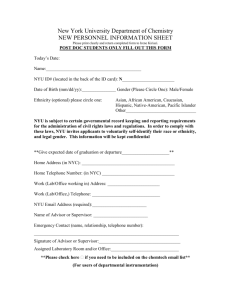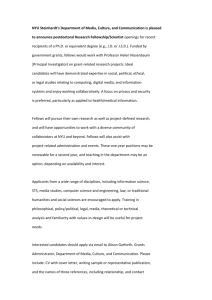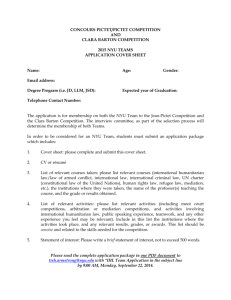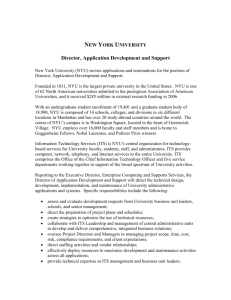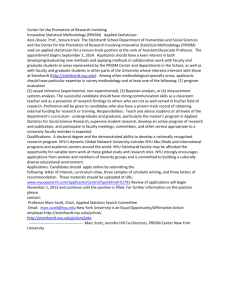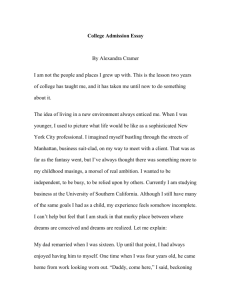Undergraduate - NYU Steinhardt
advertisement
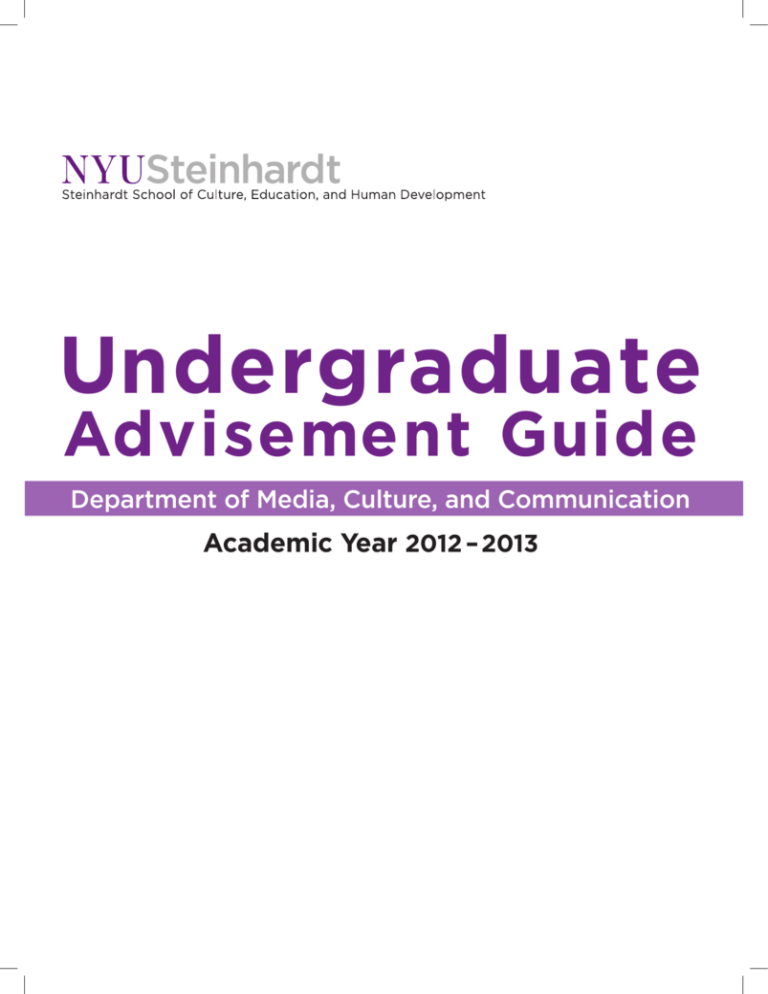
Undergraduate Advisement Guide Department of Media, Culture, and Communication Academic Year 2012 – 2013 Overview The Department of Media, Culture, and Communication (MCC) provides a rich diversity of undergraduate courses. Our academic terrain is interdisciplinary, equally informed by the humanities and social sciences. We recognize society as a form of communication, and investigate the ways in which technologies of communication record, transmit, and shape what we know and do. We value historical thinking as a way of understanding the present. With this in mind, our students explore numerous communicative and cultural practices. After attaining an understanding of foundational theory, student coursework is focused via specialized fields of study. Students select 3 courses within 2 of the following fields: Global and Transcultural Communication; Images and Screen Studies; Interaction and Social Processes; Persuasion and Politics; and Technology and Society. This component of the curriculum provides both structure and flexibility to suit students’ individual interests and goals. Working with professional communities in New York City and elsewhere, we seek to build our students’ professional competencies and support their desire to pursue careers in communication and media. Internship opportunities abound in New York City, where students learn firsthand the challenges and rewards of a career in their chosen field. To gain additional skills and contacts outside the classroom students utilize campus resources such as NYU computing facilities, participate in student clubs, and attend events hosted by the department and organizations throughout the University. Department Chair Undergraduate Advisors Marita Sturken, Ph.D. Noni Bourne Rebecca Blough Director of Undergraduate Studies Aurora Wallace, Ph.D. Associate Director for Academic Affairs Degrees Offered Bachelor of Science in Media, Culture, and Communication Master of Arts in Media, Culture, and Communication Ph.D. in Media, Culture, and Communication Jillian Sullivan Enrollment Senior Undergraduate Advisor Ivan Makar Undergraduate students = 750 Master’s students = 150 Ph.D. candidates = 40 Faculty The department is home to 30 full-time professors Arjun Appadarai who pursue original research and participate in a Rodney Benson wide array of international scholarly endeavors. As Deborah Borisoff evidence of the department’s interdisciplinary and Lily Chumley global perspective, the core faculty represents 13 Allen Feldman different academic disciplines and nine different JoEllen Fisherkeller countries of origin. Their areas of expertise include Alex Galloway global media, propaganda, visual culture, popular Brett Gary culture, music, crime and violence, technology, digital Lisa Gitelman media, anthropology of science, immigration and Radha Hegde public discourse, social networks, youth and media, Ben Kafka race and political communication, gender, Middle East Melanie Kohnen politics, and Latin American media. We encourage Liel Leibovitz undergraduates to read the faculty profiles online: Ted Magder Charlton McIlwain steinhardt.nyu.edu/mcc/faculty 2 Mark Crispin Miller Mara Mills Nick Mirzoeff Terence Moran Susan Murray Helen Nissenbaum Juan Pinon Laura Portwood-Stacer Arvind Rajagopal Erica Robles-Anderson Martin Scherzinger Marita Sturken Nicole Starosielski Helga Tawil Souri Aurora Wallace Advisement The department offers several types of advising: Primary Advisor Meetings Students will be assigned a primary advisor based on the section of New Student Seminar (NSS) they register for during the first semester of their career at Steinhardt. Primary advisors guide and assist students in navigating their academic pursuits. Please note, however, that monitoring degree progress and seeking advisement is always the responsibility of the student. Skype Meetings As many students elect to complete a semester abroad or travel home to countries outside the US on school breaks, our advisors are available to video chat with students through Skype. It is important that students stay in contact with the department and receive quality advising even when traveling internationally. Walk-in Advising If a student needs to address a basic registration issue, such as completing a drop/add form, discussing a pass/fail option, turning in an internship registration form, or obtaining a course permission form, he or she does not need to make an appointment with their primary advisor. Basic registration issues can be addressed through walk-in advising. Between the hours of 10:00 and 4:00 pm, Monday through Friday, a walk-in advisor will be on duty in the department. E-mail Advisement MCC advisors are available via email at comm.advisors@nyu.edu. Students should use this e-mail address to pose basic questions that Contact Us Students can make an appointment with their advisor by calling the front desk at 212 998 5635. All advisors monitor comm.advisors@nyu.edu, and respond to requests submitted at this address promptly. We encourage students to email basic questions rather than calling. can be answered quickly and concisely. For in-depth questions, students should schedule a primary advisor meeting. Advisement Resources Our department website is a continuously updated source of information that includes details on internships, course descriptions and syllabi, study abroad links, professor profiles, events, advisement forms and more. Bookmark the site and consult it regularly to stay informed. Peer Advisors The MCC Peer Advising Program promotes student involvement by connecting new students to student mentors. Trained and supervised by our academic advisors, peer advisors are able to assist new students in finding accurate registration and advisement information. They act as teacher’s assistants in New Student Seminar, hold weekly mentoring office hours, assist in organizing departmental conferences and represent MCC at admissions and recruitment events. Minors and Double-Majors Some students choose to complement their primary major in MCC with a minor or second major in another school or department within NYU. Students must consult with both their MCC advisor and an advisor in their potential minor/double-major department to determine if completing supplemental coursework will be a valuable and practical addition to their current academic program. 3 Degree Requirements As the undergraduate division of the Department of Media, Culture, and Communication, the program offers students the opportunity to work with internationally recognized faculty whose principal concern is the impact of communication technologies and systems on the social, political, and cultural environment. The program is designed to give students an interdisciplinary foundation in communication and media studies. The program introduces students to the major approaches in the study of communication, including interpersonal communication; forms of mass communication such as print, film, radio, television; and computer-mediated communication. In their freshman and sophomore years, students take courses in the Liberal Arts Core, core courses in the major, and begin to focus on fields of study within the major. In their junior and senior years, students complete two fields of study and restricted electives. In conjunction with the department’s advisors, students select a sequence of courses that satisfy program and degree requirements while simultaneously exploring their own intellectual and professional objectives. Additional Requirements New Student Seminar SAHS-UE 1 (0 Credits) New Student Seminar (NSS) is a required first semester course for new undergraduate students (both freshman and transfers). It orients students to the University, NYU Steinhardt, and MCC. Students are introduced to the nature of higher education, student life on and around campus and New York City, and to their major requirements. In class, students work together under the guidance of their advisor to actively explore their roles as students in this diverse and global academic community and as future professionals in their chosen fields. Senior Media Seminar MCC-UE 1200 (4 Credits) A culminating course integrating models of interpretation derived from the liberal arts with the analytical tools developed in media and communication studies. The course reflects current research interests within the department and encourages students to explore emerging issues in fields such as media and globalization, social interaction, professional ethics, and the interaction between audiences and texts. Topics vary by semester and course instructor. This course is taken when a student’s credits reach senior status. Media, Culture, and Communication Core Courses Introduction to Media Studies MCC-UE 1 Introduces students to a variety of perspectives from which to study mediated communication, and the questions and methods that characterize different approaches to communication. Perspectives surveyed include those drawn from social psychology, political economy, sociology, and communication theory. The course considers media production, content, and reception, and examines media’s influence on prevailing attitudes, values, and behaviors. History of Media and Communication MCC-UE 3 This course surveys the history of media forms and communication technologies, charting the historical trajectory from the alphabet to the Internet. It explores mediation in and across time and the emergence and development of different media forms in relation to particular social, economic, perceptual, and technological conditions and historical moments. 4 Introduction to Human Communication and Culture MCC-UE 5 This course surveys research perspectives and theories on culture and human communication. The course will introduce major approaches to the study of social interaction, language, semiotics, and cultural processes. Media and Cultural Analysis MCC-UE 14 An introduction to the approaches and practices used to analyze the content, structure, and context of contemporary media. The course focuses on the dominant critical perspectives that have contributed to our understanding of media and its role in society. The course examines different media texts using various schools of criticism such as semiotics, gender criticism, and ideological analysis. MCCU Media, Culture, and Communication Program of Study Form 2012 – 2013 Liberal Arts Requirements: (60 Points) Fields of Study Morse Academic Plan (MAP) 1) Global and Transcultural Communication 2) Images and Screen Studies 3) Interaction and Social Processes 4) Persuasion and Politics 5) Technology and Society Foreign Language 8 Expository Writing 8 English Composition Competency Examination (or equivalent) EXPOS-UA 1 ACE-UE 110 Restricted Electives Writing the Essay The Advanced College Essay Texts and Ideas Cultures and Contexts Societies and the Social Sciences Expressive Culture Liberal Arts Electives 12 (16 Points) Any course from the College of Arts & Science Unrestricted Electives (16 Points) Any undergraduate course with the exception of those from SCPS Major Requirements: (52 Points) Core Courses (16 Points) MCC-UE 1 MCC-UE 5 MCC-UE 3 MCC-UE 14 (8 Points) 8 points selected from the following programs: Foundations of Contemporary Culture 16 Complete one course from each of the following: Foundations of Scientific Inquiry Quantitative Reasoning Natural Science I or II Natural Science I or II (24 Points) 12 points required in two of the following: Introduction to Media Studies Intro to Human Communication and Culture History of Media and Communication Media and Cultural Analysis ANTH-UA SCA-UA CSCI-UA DRLIT-UA ECON-UA CRWRI-UA POL-UA JOUR-UA LWSOC-UA MUSIC-UA SOC-UA ICINE-UT PERF-UT ASPP-UT FMTV-UT CINE-UT DWPG-UT PHTI-UT REMU-UT OART-UT IDSC-UT MKTG-UB INFO-UB MCC-UE Anthropology Social and Cultural Analysis Computer Science Dramatic Literature Economics Creative Writing Politics Journalism Law and Society Music Sociology Cinema Studies International Program Performance Studies Center for Art, Society & Public Policy Film and Television Cinema Studies Dramatic Writing Photography and Imaging Recorded Music Open Arts Curriculum Interdisciplinary Seminars Marketing Information Systems Media, Culture, and Communication Additional Requirements: SAHS-UE 1 New Student Seminar MCC-UE 1200 Senior Media Seminar Total Points Required 0 4 128 5 Fields of Study Each student selects three courses in two of the following areas for a total of 24 points. Note: Not all of these courses will be offered every semester or every year. Check the MCC website for the most updated listings. MCC-UE 1210 Senior Honors Thesis can count toward any field of study. Only the Director of the MCC undergraduate program may approve course substitutions. MCC-UE MCC-UE MCC-UE MCC-UE 1452 Global Media Seminar: TV and Democracy in Italy 1453 Global Media Seminar: Post Communist Media Systems 1454 Global Media Seminar: France and Europe 1455 Global Media Seminar: Latin America Images and Screen Studies Courses focus on technologically mediated images and visual communication in everyday life. Global and Transcultural Communication Courses examine globalization in terms of the mobility of cultural products, transnational media and identity, and policy issues. MCC-UE MCC-UE MCC-UE MCC-UE MCC-UE MCC-UE MCC-UE MCC-UE MCC-UE MCC-UE MCC-UE MCC-UE MCC-UE MCC-UE MCC-UE MCC-UE MCC-UE MCC-UE MCC-UE MCC-UE MCC-UE MCC-UE 6 1005 1011 1016 1020 1022 1023 1300 1304 1305 1306 1340 1341 1342 1351 1352 1400 1401 1403 1405 1407 1410 1451 The Culture Industries Media and Migration Media Audiences The Business of Media Latino Media East Asian Media Media and Global Communication Global Media and International Law Communication and International Development Transnational Media Flows Religion and Media Islam, Media, and the West Sounds In and Out of Africa War As Media Empire, Revolution and Media Communication in Cultural Contexts (NYU Global sites) Global Cultures and Identities Postcolonial Visual Culture Copyright, Commerce, and Culture Gender, Sex, and The Global Global Visual Culture Global Media Seminar: Media in China MCC-UE 1002 Space and Place in Human Communication MCC-UE 1003 Introduction to Digital Media MCC-UE 1006 Television: History and Form MCC-UE 1007 Film: History and Form MCC-UE 1008 Video Games: Culture and Industry MCC-UE 1009 Psychoanalysis: Desire and Culture MCC-UE 1012 Crime, Violence, and Media MCC-UE 1015 Advertising and Society (Washington Square and Prague) MCC-UE 1021 Dead Media Research Studio MCC-UE 1022 Latino Media MCC-UE 1024 Amateur Media MCC-UE 1029 New Media Research Studio MCC-UE 1030 Architecture as Media MCC-UE 1065 Media Events and Spectacle MCC-UE 1140 Screening History MCC-UE 1151 Media History of New York MCC-UE 1345 Fashion and Power MCC-UE 1347 Cultural History of the Screen MCC-UE 1351 War As Media MCC-UE 1352 Empire, Revolution, and Media MCC-UE 1403 Postcolonial Visual Culture MCC-UE 1410 Global Visual Culture MCC-UE 1411 Visual Culture in Science and Technology MCC-UE 1517 Photography and the Visual Archive Interaction and Social Processes Courses analyze communication dynamics, interaction rituals, language and nonverbal practices in social and technologically mediated contexts. MCC-UE 1009 Psychoanalysis: Desire and Culture MCC-UE 1011 Media and Migration MCC-UE 1013 Political Communication MCC-UE 1016 Media Audiences MCC-UE 1017 Youth Media: Communication, Community, and Social Change MCC-UE 1018 Kids in Media Culture MCC-UE 1019 Media and Identity MCC-UE 1025 Race and Media MCC-UE 1026 Disability, Technology and Media MCC-UE 1027 Environmental Communication MCC-UE 1032 Social Media Networking MCC-UE 1036 Telephone and Mobile Communication Technology MCC-UE 1037 Music and Media MCC-UE 1040 Health and Media Communication MCC-UE 1342 Sounds In and Out of Africa MCC-UE MCC-UE MCC-UE MCC-UE MCC-UE MCC-UE MCC-UE MCC-UE MCC-UE MCC-UE MCC-UE MCC-UE MCC-UE MCC-UE 1345 Fashion and Power 1401 Global Cultures and Identities 1404 Media and the Culture of Money 1407 Gender, Sex and The Global 1408 Queer Identity and Popular Culture 1508 Print: History and Form 1571 The Rise of Internet Media 1700 Gender and Communication 1717 Listening: Noise, Sound, and Music 1745 Organizational Communication 1800 Political Rhetoric 1815 Conflict Management 1830 Interpersonal Communication 1835 Argumentation and Debate Persuasion and Politics Courses examine communication media, institutions and technologies as used for the purposes of manipulation and mobilization of opinions, public values, and actions. MCC-UE 1010 Censorship in American Culture MCC-UE 1013 Political Communication MCC-UE 1014 Mass Persuasion and Propaganda MCC-UE 1015 Advertising and Society (Washington Square and Prague) MCC-UE 1017 Youth Media: Communication, Community, and Social Change MCC-UE 1023 East Asian Media MCC-UE 1025 Race and Media MCC-UE 1027 Environmental Communication MCC-UE 1028 Ethics and Media MCC-UE 1040 Health and Media Communication MCC-UE 1065 Media Events and Spectacle MCC-UE 1140 Screening History MCC-UE 1304 Global Media and International Law MCC-UE 1340 Religion and Media MCC-UE 1341 Islam, Media and the West MCC-UE 1402 Marxism and Culture MCC-UE 1404 Media and the Culture of Money MCC-UE 1406 Hacker Culture & Politics MCC-UE 1408 Queer Identity and Popular Culture MCC-UE 1750 Public Relations: Theory and Process MCC-UE 1800 Political Rhetoric MCC-UE 1821 Media, Policy, and Regulation MCC-UE 1835 Argumentation and Debate Technology and Society Courses that focus on social implications of new technologies of information, communication, and digital media. MCC-UE 1003 Introduction to Digital Media MCC-UE 1006 Television: History and Form MCC-UE 1007 Film: History and Form MCC-UE 1008 Video Games: Culture and Industry MCC-UE 1012 Crime, Violence, and Media MCC-UE 1020 The Business of Media MCC-UE 1021 Dead Media Research Studio MCC-UE 1024 Amateur Media MCC-UE 1026 Disability, Technology, and Media MCC-UE 1028 Ethics and Media MCC-UE 1029 New Media Research Studio MCC-UE 1030 Architecture as Media MCC-UE 1032 Social Media Networking MCC-UE 1034 Media, Technology, and Society MCC-UE 1036 Telephone and Mobile Communication MCC-UE 1037 Music and Media MCC-UE 1151 Media History of New York MCC-UE 1300 Media and Global Communication MCC-UE 1303 Privacy and Media Technology MCC-UE 1305 Communication and International Development MCC-UE 1347 Cultural History of the Screen MCC-UE 1402 Marxism and Culture MCC-UE 1405 Copyright, Commerce and Culture MCC-UE 1406 Hacker Culture and Politics MCC-UE 1411 Visual Culture in Science and Technology MCC-UE 1508 Print: History and Form MCC-UE 1571 The Rise of Internet Media MCC-UE 1717 Listening: Noise, Sound, and Music Restricted Electives Restricted Electives are courses related to the study of media, culture, and communication and are designed to provide students with the ability to explore applied or practical courses in their field of interest or to further explore an area of theoretical interest. Students are required to take 8 credits of Restricted Electives. Students who declare a minor or second major may not double count these required courses towards specialization electives. The only exception to this is a second major in Journalism or minor in Producing. Please note that Restricted Electives cannot be taken pass/fail. For a full list of programs applicable to the requirement, please refer to page 5. MCC Restricted Electives Include: MCC-UE 1100 Internship MCC-UE 1740 Interviewing Strategies MCC-UE 1755 Public Relations: Principles and Practices MCC-UE 1760 Innovations in Marketing MCC-UE 1775 Advertising and Marketing MCC-UE 1780 Advertising Campaigns MCC-UE 1805 Public Speaking MCC-UE 1808 Persuasion * The aforementioned MCC courses cannot count toward Field of Study credit. They only count toward Restricted Electives. 7 Academic Integrity Academic integrity is the guiding principle for all that one does, from taking exams, making oral presentations to writing term papers. It requires that students recognize and acknowledge information derived from others, and take credit only for original ideas and work. Students violate the principle of academic integrity when they: • Cheat on an exam; • Submit the same work for two different courses without prior permission from professors; • Receive help on a take-home examination that calls for independent work; • Plagiarize. Plagiarism, one of the gravest forms of academic dishonesty, whether intended or not, is academic fraud. In a community of scholars, whose members are teaching, learning, and discovering knowledge, plagiarism cannot be tolerated. Plagiarism is failure to properly assign authorship to a paper, a document, an oral presentation, a musical score and/or other materials which are not original work. One plagiarizes when, without proper attribution, one does any of the following: • Copy verbatim from a book, an article or other media; • Download documents from the Internet; • Purchase documents; • Report from another’s oral work; • Paraphrase or restate someone else’s facts, analysis and/or conclusions; • Copy directly from a classmate or allow a classmate to copy. Avoiding Academic Dishonesty To help avoid academic dishonesty, students should: • Organize their time appropriately to avoid undue pressure and acquire good study habits, including note taking. • Learn proper forms of citation. Check with professors for their preferred style guides. Directly copied material must always be in quotes; paraphrased material must be acknowledged; even ideas and organization derived from previous personal work or another’s need to be acknowledged. • Always proofread finished work to be sure that quotation marks or footnotes or other references were not inadvertently omitted. Know the source of each citation. • Save their notes and drafts of papers as evidence of original work. • Not submit the same work for more than one class without first obtaining the permission of both professors. Academic Honors Dean’s List Honors in MCC Compiled at the end of the fall and spring terms, the Dean’s List serves as an honor roll for undergraduates who have maintained a term average of 3.7 or better in a program of study of at least 12 credits in Steinhardt. Grades of F, I, P, N, or R disqualify students. Undertaking the Honors Program is an exciting and demanding opportunity for students with outstanding academic records and a serious intellectual curiosity about the discipline. The program prepares and guides students to pursue original, independent research under the supervision of a full-time faculty member during the senior year. Producing an honors thesis is a challenging experience that can reap many benefits, including close mentorship from a faculty member, the opportunity to further explore a specific intellectual question or issue that piques one’s curiosity, and the development of strong research, writing, and critical thinking skills that can strengthen a student’s portfolio in graduate school or professional setting. A program of this caliber often represents the most defining and culminating experience of one’s undergraduate study. Latin Honors Students meeting the requirement of having completed at least 64 points toward the degree (in weighted grades) in residence in Steinhardt will be eligible for consideration. Latin Honors will be determined by GPA distribution, so that: • Summa cum laude is limited to the top 5% of the graduating class • Magna cum laude is limited to the top 10% of the graduating class • Cum laude is limited to the next 15% of the graduating class For more information about Latin Honors, visit: nyu.edu/registrar/graduation/latin-honors.html 8 For more information, visit: steinhardt.nyu.edu/mcc/undergraduate/honors Connections Outside the Classroom We encourage students to participate actively in the social and academic life of MCC. Toward that end, students should consider joining any (or all) of the student organizations coordinated through the department and attending our events, which take place throughout the year. Contact any advisor for information on how to get involved in these programs. ➜ Our Undergraduate Conference brings together MCC students, faculty, advising staff, and guests from the professional community to explore current themes in the field. ➜ The NYU Comm Club and the Public Relations Student Society of America (PRSSA), run by MCC students, are open to all students at NYU. These groups provide networking opportunities through an array of academic, social, and cultural activities including faculty talks, community service, and field trips to movie screenings, talk shows, museums, and studios. Study Abroad We strongly encourage all students to study abroad during their time at NYU. The university has many study abroad sites, which students can attend for course credit: Accra (Ghana), Berlin, Buenos Aires, Florence, London, Madrid, Paris, Prague, Shanghai, Sydney, and Tel Aviv. In addition to these semester-long programs, our department leads summer abroad courses in Buenos Aires and Paris, which count as upperlevel courses. The university also sponsors many other summer study abroad programs in a variety of destinations. More information can be obtained through the advising office or MCC website. Global Media Scholars Program MCC’s Global Media Scholars Program (GMSP) immerses students in the study of media and globalization through NYU’s academic sites abroad. The centerpiece of the program is a twosemester sequence starting the spring of students’ sophomore year at their choice of NYU campuses in Paris or Prague followed by a second semester in the fall of students’ junior year at their choice of NYU campuses in Buenos Aires or Shanghai. Finally, students will take part in a special Senior Media Seminar capstone course during the January Winter (Intersession) term of their senior year. Freshmen will be invited to apply. Contact an academic advisor for details and an application. steinhardt.nyu.edu/mcc/study_abroad ➜ The Student/Alumni Roundtables event is a unique opportunity for current students to speak directly with recent alumni of our undergraduate and graduate programs about their career paths. Alumni offer interviewing tips, career advice, and strategies for students seeking work in a variety of fields including Public Relations, Advertising, Marketing, Film and Television, Media Planning, Music Publicity, Publishing, and Non-Profit organizations. ➜ The Center for Communication is a media forum that offers free seminars for students and faculty, connecting them to a wide variety of leading professionals in the field. We have partnered with the Center to bring their distinguished panelists to the NYU campus, providing an insider’s view for those seeking work in media and communications. ➜ Our honors students present their independent research during our Honors Thesis Presentation night. The event offers participants the opportunity to sharpen their presentation skills and lets attendees learn about the various academic interests and methodologies explored by their peers. Internships A truly distinctive facet of being an MCC major is the opportunity to complete internships in New York City, the media capital of the world. Our students have established an outstanding reputation within the various communication industries. We have built strong ties with companies of all kinds, including leading corporations, small entrepreneurial entities, and non-profit organizations. The internship program promotes the integration of academic theory with practical experience. On site, interns gain networking opportunities, are mentored by industry professionals, and learn the skills necessary to succeed in their industry. Above all, the internship program expands understanding of the dynamics of the ever-changing field of media and communication. Often, students will use their internship to either validate career aspirations or develop new direction. We encourage most students to do several internships during their academic career. For advice on securing an internship, eligibility requirements for earning course credit, current internship postings, and career resources consult: steinhardt.nyu.edu/mcc/internships Note: Students must be of junior or senior status to intern for credit (64 credits completed). 9 12 16 __________ __________ __________ __________ __________ __________ __________ ________________________________________ ________________________________________ ________________________________________ ________________________________________ ________________________________________ ________________________________________ ________________________________________ ________________________________________ ________________________________________ Total Unrestricted Electives Required Unrestricted Electives Total Liberal Arts Credits Required 16 60 __________ __________ __________ __________ __________ __________ __________ __________ __________ ________________________________________ ________________________________________ ________________________________________ ________________________________________ ________________________________________ ________________________________________ ________________________________________ ________________________________________ ________________________________________ Spring Year: ________ _____ _____ _____ _____ _____ _____ _____ _____ _____ _____ _____ _____ _____ _____ _____ _____ _____ _____ _____ _____ _________________ _________________ _________________ _________________ _________________ _________________ _________________ _________________ _________________ _________________ _________________ _________________ _________________ _________________ _________________ _________________ _________________ _________________ _________________ _________________ COMPLETED SEMESTER/COLLEGE TERM STARTED: Fall ________________________________________ ________________________________________ COURSE TITLE Liberal Arts Electives 16 or _____ with point differential These courses must be taken at the College of Arts and Science Natural Science II or III Natural Science I or II Quantitative Reasoning Foundations of Scientific Inquiry Expressive Culture Social Science Cultures and Contexts Texts and Ideas Foundations of Contemporary Culture EXPOS-UA 1 ACE-UE 110 Writing the Essay 8 __________ __________ CREDITS COURSE # 8 ID#: N________________________ Advanced College Essay Expository Writing AREA Foreign Language Liberal Arts Requirements NAME:___________________________________________ Degree Requirement Checklist - 128 Credits Required to Graduate Media, Culture, and Communication 16 MCC-UE 1 MCC-UE 5 MCC-UE 3 MCC-UE 14 CREDITS COURSE # Intro to Media Studies Intro to Human Communication and Culture History of Media and Communication Media and Cultural Analysis COURSE TITLE 4 4 4 4 8 4 0 SAHS-UE 1 4 MCC-UE 1200 Restricted Electives Other Requirements New Student Seminar Senior Media Seminar ________________________________________ __________ Notes: Total Major Credits Required 52 __________ __________ __________ __________ ________________________________________ ________________________________________ ________________________________________ ________________________________________ ________________________________________ ________________________________________ ________________________________________ __________ See approved list on web site : http://steinhardt.nyu.edu/mcc/undergraduate/electives ________________________________________ __________ ________________________________________ __________ 12 ________________________________________ __________ Area Two:_______________________ ________________________________________ __________ 12 Area One:_______________________ _____ _____ _____ _____ _____ _____ _____ _____ _____ _____ _____ _____ _________________ _________________ _________________ _________________ _________________ _________________ _________________ _________________ _________________ _________________ _________________ _________________ _________________ _________________ _________________ _________________ COMPLETED SEMESTER/COLLEGE Fields of Study 24 Choose two of the following areas: Global and Transcultural Communication, Images and Screen Studies, Interaction and Social Processes, Persuasion and Politics, or Technology and Society AREA Core Courses Major Requirements Degree Requirement Checklist - 128 Credits Required to Graduate Media, Culture, and Communication NYU Resources Resources Beyond NYU Steinhardt Student Affairs steinhardt.nyu.edu/studentaffairs/contact Steinhardt Resources steinhardt.nyu.edu/portal/current_students Look into these New York-based professional associations for seminars, student chapters, mentoring programs, and networking, job, and internship opportunities. NYU Student Resource Center nyu.edu/src The Center for Communication cencom.org NYU Libraries library.nyu.edu Advertising Women of New York (AWNY) awny.org Office of Financial Aid nyu.edu/financial.aid NYU Registrar nyu.edu/registrar Office of the Bursar nyu.edu/bursar Office for International Student and Scholars (OISS) nyu.edu/oiss The Student Health Center nyu.edu/health Wellness Exchange nyu.edu/999 The Moses Center for Students with Disabilities nyu.edu/csd NYU Lesbian, Gay, Bisexual, Transgender, and Queer Student Center nyu.edu/lgbt Center for Multicultural Education and Programs (CMEP) cmep.nyu.edu Wasserman Center for Career Development nyu.edu/careerdevelopment Public Relations Society of America, NY Chapter prsany.org American Association of Advertising Agencies aaaa.org American Marketing Association-NY Chapter nyama.org New York Coalition of Professional Women in the Arts & Media, Inc. nycwam.org New York Women in Film and Television (NYWF&T) nywift.org Public Relations Student Society of America (PRSSA) prssa.org Association for Conflict Resolution, NY Chapter acrgny.org National Communication Association natcom.org Eastern Communication Association ecasite.org Media Communications Association-International mcainy.org Media Bistro mediabistro.com facebook.com/mccNYU @mccNYU Department of Media, Culture, and Communication New York University 239 Greene Street New York, NY 10003 Main line: 212 998 5191 Undergraduate advising: 212 998 5635 steinhardt.nyu.edu/mcc Advertising Club of New York theadvertisingclub.org Women in Communications, NY Chapter nywici.org
